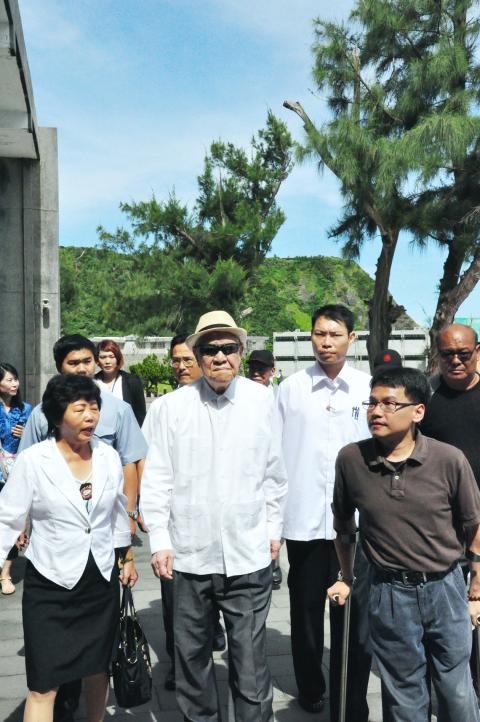Four former political prisoners yesterday shared their stories with former president Lee Teng-hui (李登輝) at the Green Island Human Rights Memorial Park and said that the nation’s tragic past should be remembered so that democracy and freedom could persevere.
“We came back here as winners, because they [the former Chinese Nationalist Party (KMT) regime] did not defeat us. They wanted us to die, but we survived,” said Kuo Chen-chun (郭振純), one of the four.
The park was originally home to two prisons built to accommodate political prisoners during the White Terror era.

Photo: CNA
The four, all “first-generation” prisoners, were kept in the prison, which jailed more than 1,300 at its peak, between the 1950s and 1960s.
Kuo was 28 years old when he was arrested in 1953 and was sentenced to 22 years for treason.
Tsai Kun-lin (蔡焜霖) was only 20 when he was accused of “associating with the communists” because one of his friends was a member of the Chinese Communist Party (CCP).
Tsai described his time in prison in a more positive tone, saying that prison “felt like a university or a graduate program” because the majority of the political prisoners on the island were from the social elite, including university professors, physicians and artists, so he had learned a lot.
Chang Chang-mei (張常美) was one of the few female political prisoners on the island.
She was an 18-year-old high-school student when she was sent to prison after a student association member accused her of being a CCP member.
Chang, who married a man who had been a political prisoner on the island after they were released, complained about the former KMT administration’s intentional neglect of the White Terror era history in school textbooks.
“Children nowadays do not know what happened because they were never taught about it,” Chang said.
Chen Meng-he (陳孟和) echoed Chang’s view, saying that although President Ma Ying-jeou (馬英九) has apologized to former political prisoners four or five times, he still tries to find excuses for the KMT’s authoritarian past.
That is why former prisoners appreciated Lee’s 1999 apology to political prisoners and their families — the first time a president apologized on behalf of the government — said Chen, a painter who was imprisoned for 15 years.
“Taiwan was ‘silenced’ during the 38 years of martial law, with many members of the social elite wiped out or imprisoned for what they believed or even for something they had not done,” Lee said.
“That was why I had to do what I could — push for the compensation of or restoration of the reputation of [political] prisoners,” the former president added.
Lee and the former prisoners visited the memorial park, where prison buildings have been turned into exhibition spaces, and paid tribute to the hundreds of former prisoners whose names have been etched in stone.
Speaking in front of the memorial monument, Lee spoke about the “power of memory,” saying that history should not be forgotten and only by remembering its past could Taiwan find the direction to move forward.
Lee is scheduled to conclude his three-day visit to Taitung today.

The manufacture of the remaining 28 M1A2T Abrams tanks Taiwan purchased from the US has recently been completed, and they are expected to be delivered within the next one to two months, a source said yesterday. The Ministry of National Defense is arranging cargo ships to transport the tanks to Taiwan as soon as possible, said the source, who is familiar with the matter. The estimated arrival time ranges from late this month to early next month, the source said. The 28 Abrams tanks make up the third and final batch of a total of 108 tanks, valued at about NT$40.5 billion

Travel agencies in Taiwan are working to secure alternative flights for travelers bound for New Zealand for the Lunar New Year holiday, as Air New Zealand workers are set to strike next week. The airline said that it has confirmed that the planned industrial action by its international wide-body cabin crew would go ahead on Thursday and Friday next week. While the Auckland-based carrier pledged to take reasonable measures to mitigate the impact of the workers’ strike, an Air New Zealand flight arriving at Taipei from Auckland on Thursday and another flight departing from Taipei for Auckland on Saturday would have to

A group from the Taiwanese Designers in Australia association yesterday represented Taiwan at the Midsumma Pride March in Melbourne. The march, held in the St. Kilda suburb, is the city’s largest LGBTQIA+ parade and the flagship event of the annual Midsumma Festival. It attracted more than 45,000 spectators who supported the 400 groups and 10,000 marchers that participated this year, the association said. Taiwanese Designers said they organized a team to march for Taiwan this year, joining politicians, government agencies, professionals and community organizations in showing support for LGBTQIA+ people and diverse communities. As the first country in Asia to legalize same-sex

MOTIVES QUESTIONED The PLA considers Xi’s policies toward Taiwan to be driven by personal considerations rather than military assessment, the Epoch Times reports Chinese President Xi Jinping’s (習近平) latest purge of the Chinese People’s Liberation Army (PLA) leadership might have been prompted by the military’s opposition to plans of invading Taiwan, the Epoch Times said. The Chinese military opposes waging war against Taiwan by a large consensus, putting it at odds with Xi’s vision, the Falun Gong-affiliated daily said in a report on Thursday, citing anonymous sources with insight into the PLA’s inner workings. The opposition is not the opinion of a few generals, but a widely shared view among the PLA cadre, the Epoch Times cited them as saying. “Chinese forces know full well that